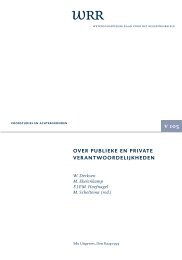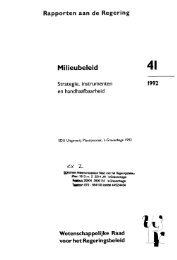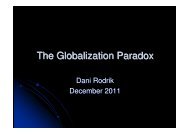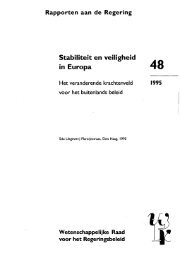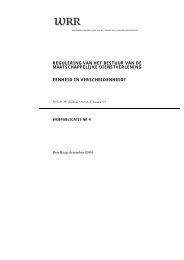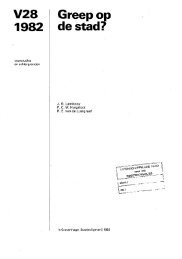De overheid als keuzearchitect? - Wetenschappelijke Raad voor het ...
De overheid als keuzearchitect? - Wetenschappelijke Raad voor het ...
De overheid als keuzearchitect? - Wetenschappelijke Raad voor het ...
You also want an ePaper? Increase the reach of your titles
YUMPU automatically turns print PDFs into web optimized ePapers that Google loves.
public policy nudges: the government as choice architect<br />
knob. Which is better than chance, but only slightly. Compare that<br />
to the stove on the other picture, where we have not even labeled the<br />
knobs but no one would ever make a mistake.<br />
So we have a good design and a bad design. Our point is: why not<br />
choose good designs? Which brings me to the most famous Dutch<br />
contribution to choice architecture. Now for the ladies in the audience,<br />
this represents your best chance at seeing the inside of the men’s<br />
toilet at Schiphol airport. You can see that there is something in there.<br />
I actually made sure that these flies were still there yesterday when<br />
I arrived at the airport. Now this was an innovation introduced by a<br />
former economist. I think this may be the best thing economists have<br />
ever done. The idea is that when men are ‘taking care of business’,<br />
they aren’t paying very much attention to the task at hand. But if you<br />
give them a target, they will aim. According to the people at Schiphol<br />
airport, spillage has been reduced by 80 per cent. Now that fly has<br />
become my best example of a nudge.<br />
13<br />
So what is a nudge? A nudge is some small feature of the environment<br />
that attracts our attention and influences our behavior. It is<br />
important to stress that nudges work on humans but not on econs. So<br />
econs choose optically without nudges but humans sometimes need<br />
a nudge. We have a chapter on the principles of good choice architecture.<br />
I do not have time to talk about all of them today, so let me give<br />
some examples of the first three principles. The first is default. We<br />
have heard that the default option today is to speak Dutch, which I<br />
am opting out of. Normally, a default option is just what happens if<br />
you do nothing. So normally what happens if you do nothing is that<br />
nothing happens. But sometimes for example you walk away from<br />
your computer and if you go long enough, the screen saver comes on<br />
or the computer locks itself. How long that takes, is itself a default<br />
option that came on your computer, and most people never change<br />
it. The most important point about default options is that they are<br />
sticky. So whoever chooses the default options has a lot of power.<br />
Let me give two examples of this. The first we have lots and lots of<br />
data about. In the us we have for the last 25 years been switching over<br />
from a system of defined benefit plans to defined contribution plans,



